- Home
- Roald Dahl
The Best of Roald Dahl Page 15
The Best of Roald Dahl Read online
Page 15
'D'you mind the pipe?' he asked, holding it up in his fingers. That was all he said. But the sound of his voice had a sudden and extraordinary effect upon me. In fact, I think I jumped. Then I sort of froze up and sat staring at him for at least a minute before I got a hold of myself and made an answer.
'This is a smoker,' I said, 'so you may do as you please.'
'I just thought I'd ask.'
There it was again, that curiously crisp, familiar voice, clipping its words and spitting them out very hard and small like a little quick-firing gun shooting out raspberry seeds. Where had I heard it before? And why did every word seem to strike upon some tiny tender spot far back in my memory? Good heavens, I thought. Pull yourself together. What sort of nonsense is this?
The stranger returned to his paper. I pretended to do the same. But by this time I was properly put out and I couldn't concentrate at all. Instead, I kept stealing glances at him over the top of the editorial page. It was really an intolerable face, vulgarly, almost lasciviously handsome, with an oily salacious sheen all over the skin. But had I or had I not seen it before sometime in my life? I began to think I had, because now, even when I looked at it I felt a peculiar kind of discomfort that I cannot quite describe - something to do with pain and with violence, perhaps even with fear.
We spoke no more during the journey, but you can well imagine that by then my whole routine had been thoroughly upset. My day was ruined; and more than one of my clerks at the office felt the sharper edge of my tongue, particularly after luncheon when my digestion started acting up on me as well.
The next morning, there he was again standing in the middle of the platform with his cane and his pipe and his silk scarf and his nauseatingly handsome face. I walked past him and approached a certain Mr Grummitt, a stockbroker who has been commuting with me for over twenty-eight years. I can't say I've ever had an actual conversation with him before - we are rather a reserved lot on our station - but a crisis like this will usually break the ice.
'Grummitt,' I whispered. 'Who's the bounder?'
'Search me,' Grummitt said.
'Pretty unpleasant.'
'Very.'
'Not going to be a regular, I trust.'
'Oh God,' Grummitt said.
Then the train came in.
This time, to my great relief, the man got into another compartment.
But the following morning I had him with me again.
'Well,' he said, settling back in the seat directly opposite. 'It's a topping day.' And once again I felt that slow uneasy stirring of the memory, stronger than ever this time, closer to the surface but not yet quite within my reach.
Then came Friday, the last day of the week. I remember it had rained as I drove to the station, but it was one of those warm sparkling April showers that last only five or six minutes, and when I walked on to the platform, all the umbrellas were rolled up and the sun was shining and there were big white clouds floating in the sky. In spite of this, I felt depressed. There was no pleasure in this journey for me any longer. I knew the stranger would be there. And sure enough, he was, standing with his legs apart just as though he owned the place and this time swinging his cane casually back and forth through the air.
The cane! That did it! I stopped like I'd been shot.
'It's Foxley!' I cried under my breath. 'Galloping Foxley! And still swinging his cane!'
I stepped closer to get a better look. I tell you I've never had such a shock in all my life. It was Foxley all right. Bruce Foxley or Galloping Foxley as we used to call him. And the last time I'd seen him, let me see - it was at school and I was no more than twelve or thirteen years old.
At that point the train came in, and heaven help me if he didn't get into my compartment once again. He put his hat and cane up on the rack, then turned and sat down and began lighting his pipe. He glanced up at me through the smoke with those rather small cold eyes and he said, 'Ripping day, isn't it. Just like summer.'
There was no mistaking the voice now. It hadn't changed at all. Except that the things I had been used to hearing it say were different.
'All right Perkins,' it used to say. 'All right you nasty little boy. I am about to beat you again.'
How long ago was that? It must be nearly fifty years. Extraordinary, though, how little the features had altered. Still the same arrogant tilt of the chin, the flaring nostrils, the contemptuous staring eyes that were too small and a shade too close together for comfort; still the same habit of thrusting his face forward at you, impinging on you, pushing you into a corner, and even the hair I could remember - coarse and slightly wavy, with just a trace of oil all over it, like a well-tossed salad. He used to keep a bottle of green hair mixture on the side table in his study - when you have to dust a room you get to know and to hate all the objects in it - and this bottle had the Royal coat of arms on the label and the name of a shop in Bond Street, and under that, in small print, it said 'By Appointment - Hairdressers To His Majesty King Edward VII'. I remember that particularly because it seemed so funny that a shop should want to boast about being hairdresser to someone who was practically bald - even a monarch.
And now I watched Foxley settle back in his seat and begin reading his paper. It was a curious sensation, sitting only a yard away from this man who fifty years before had made me so miserable that I had once contemplated suicide. He hadn't recognized me; there wasn't much danger of that because of my moustache. I felt fairly sure I was safe and could sit there and watch him all I wanted.
Looking back on it, there seems little doubt that I suffered very badly at the hands of Bruce Foxley my first year in school, and strangely enough, the unwitting cause of it all was my father. I was twelve and a half when I first went off to this fine old Public School. That was, let me see, in 1907. My father, who wore a silk topper and morning coat, escorted me to the station, and I can remember how we were standing on the platform among piles of wooden tuck-boxes and trunks and what seemed like thousands of very large boys milling about and talking and shouting at one another, when suddenly somebody who was wanting to get by us gave my father a great push from behind and nearly knocked him off his feet.
My father, who was a small, courteous, dignified person, turned round with surprising speed and seized the culprit by the wrist.
'Don't they teach you better manners than that at this school, young man,' he said.
The boy, at least a head taller than my father, looked down at him with a cold, arrogant-laughing glare, and said nothing.
'It seems to me,' my father said, staring back at him, 'that an apology would be in order.'
But the boy just kept on looking down his nose at my father with this funny little arrogant smile at the corners of his mouth, and his chin kept coming further and further out.
'You strike me as being an impudent and ill-mannered boy,' my father went on. 'And I can only pray that you are an exception in your school. I would not wish for any son of mine to pick up such habits.'
At this point, the big boy inclined his head slightly in my direction, and a pair of small, cold, rather close together eyes looked down into mine. I was not particularly frightened at the time; I knew nothing about the power of senior boys over junior boys at Public Schools; and I can remember that I looked straight back at him in support of my father, whom I adored and respected.
When my father started to say something more, the boy simply turned away and sauntered slowly down the platform into the crowd.
Bruce Foxley never forgot this episode; and of course the really unlucky thing about it for me was that when I arrived at school I found myself in the same 'house' as him. Even worse than that - I was in his study. He was doing his last year, and he was a prefect - a 'boazer' we called it - and as such he was officially permitted to beat any of the fags in the house. But being in his study, I automatically became his own particular, personal slave. I was his valet and cook and maid and errand-boy, and it was my duty to see that he never lifted a finger for himself unless abso
lutely necessary. In no society that I know of in the world is a servant imposed upon to the extent that we wretched little fags were imposed upon by the boazers at school. In frosty or snowy weather I even had to sit on the seat of the lavatory (which was in an unheated outhouse) every morning after breakfast to warm it before Foxley came along.
I could remember how he used to saunter across the room in his loosejointed, elegant way, and if a chair were in his path he would knock it aside and I would have to run over and pick it up. He wore silk shirts and always had a silk handkerchief tucked up his sleeve, and his shoes were made by someone called Lobb (who also had a Royal crest). They were pointed shoes, and it was my duty to rub the leather with a bone for fifteen minutes each day to make it shine.
But the worst memories of all had to do with the changing-room.
I could see myself now, a small pale shrimp of a boy standing just inside the door of this huge room in my pyjamas and bedroom slippers and brown camel-hair dressing-gown. A single bright electric bulb was hanging on a flex from the ceiling, and all around the walls the black and yellow football shirts with their sweaty smell filling the room, and the voice, the clipped, pip-spitting voice was saying, 'So which is it to be this time? Six with the dressing-gown on - or four with it off?'
I never could bring myself to answer this question. I would simply stand there staring down at the dirty floor-planks, dizzy with fear and unable to think of anything except that this other larger boy would soon start smashing away at me with his long, thin, white stick, slowly, scientifically, skilfully, legally, and with apparent relish, and I would bleed. Five hours earlier, I had failed to get the fire to light in his study. I had spent my pocket money on a box of special firelighters and I had held a newspaper across the chimney opening to make a draught and I had knelt down in front of it and blown my guts out into the bottom of the grate; but the coals would not burn.
'If you're too obstinate to answer,' the voice was saying, 'then I'll have to decide for you.'
I wanted desperately to answer because I knew which one I had to choose. It's the first thing you learn when you arrive. Always keep the dressing-gown on and take the extra strokes. Otherwise you're almost certain to get cut. Even three with it on is better than one with it off.
'Take it off then and get into the far corner and touch your toes. I'm going to give you four.'
Slowly I would take it off and lay it on the ledge above the boot-lockers. And slowly I would walk over to the far corner, cold and naked now in my cotton pyjamas, treading softly and seeing everything around me suddenly very bright and flat and far away, like a magic lantern picture, and very big, and very unreal, and sort of swimming through the water in my eyes.
'Go on and touch your toes. Tighter - much tighter than that.'
Then he would walk down to the far end of the changing-room and I would be watching him upside down between my legs, and he would disappear through a doorway that led down two steps into what we called 'the basin-passage'. This was a stone-floored corridor with wash basins along one wall, and beyond it was the bathroom. When Foxley disappeared I knew he was walking down to the far end of the basin-passage. Foxley always did that. Then, in the distance, but echoing loud among the basins and the tiles, I would hear the noise of his shoes on the stone floor as he started galloping forward, and through my legs I would see him leaping up the two steps into the changing-room and come bounding towards me with his face thrust forward and the cane held high in the air. This was the moment when I shut my eyes and waited for the crack and told myself that whatever happened I must not straighten up.
Anyone who has been properly beaten will tell you that the real pain does not come until about eight or ten seconds after the stroke. The stroke itself is merely a loud crack and a sort of blunt thud against your backside, numbing you completely. (I'm told a bullet wound does the same.) But later on, oh my heavens, it feels like someone is laying a red hot poker right across your naked buttocks and it is absolutely impossible to prevent yourself from reaching back and clutching it with your fingers.
Foxley knew all about this time lag, and the slow walk back over a distance that must altogether have been fifteen yards gave each stroke plenty of time to reach the peak of its pain before the next one was delivered.
On the fourth stroke I would invariably straighten up. I couldn't help it. It was an automatic defence reaction from a body that had had as much as it could stand.
'You flinched,' Foxley would say. 'That one doesn't count. Go on - down you get.'
The next time I would remember to grip my ankles.
Afterwards, he would watch me as I walked over - very stiff now and holding my backside - to put on my dressing-gown, but I would always try to keep turned away from him so he couldn't see my face. And when I went out, it would be, 'Hey you! Come back!'
I was in the passage then, and I would stop and turn and stand in the doorway, waiting.
'Come here. Come on, come back here. Now - haven't you forgotten something?'
All I could think of at that moment was the excruciating burning pain in my behind.
'You strike me as being an impudent and ill-mannered boy,' he would say, imitating my father's voice. 'Don't they teach you better manners than that at this school?'
'Thank ... you,' I would stammer. 'Thank ... you ... for the beating.'
And then back up the dark stairs to the dormitory and it became much better then because it was all over and the pain was going and the others were clustering round and treating me with a certain rough sympathy born of having gone through the same thing themselves, many times.
'Hey Perkins, let's have a look.'
'How many d'you get?'
'Five, wasn't it. We heard them easily from here.'
'Come on, man. Let's see the marks.'
I would take down my pyjamas and stand there while this group of experts solemnly examined the damage.
'Rather far apart, aren't they? Not quite up to Foxley's usual standard.'
'Two of them are close. Actually touching. Look - these two are beauties!'
'That low one was a rotten shot.'
'Did he go right down the basin-passage to start his run?'
'You got an extra one for flinching, didn't you?'
'By golly, old Foxley's really got it in for you, Perkins.'
'Bleeding a bit too. Better wash it, you know.'
Then the door would open and Foxley would be there, and everyone would scatter and pretend to be doing his teeth or saying his prayers while I was left standing in the centre of the room with my pants down.
'What's going on here?' Foxley would say, taking a quick look at his own handiwork. 'You - Perkins! Put your pyjamas on properly and get into bed.'
And that was the end of a day.
Through the week, I never had a moment of time to myself. If Foxley saw me in the study taking up a novel or perhaps opening my stamp album, he would immediately find something for me to do. One of his favourites, especially when it was raining outside, was, 'Oh Perkins, I think a bunch of wild irises would look rather nice on my desk, don't you?'
Wild irises grew only around Orange Ponds. Orange Ponds was two miles down the road and half a mile across the fields. I would get up from my chair, put on my raincoat and my straw hat, take my umbrella - my brolly - and set off on this long and lonely trek. The straw hat had to be worn at all times outdoors, but it was easily destroyed by rain; therefore the brolly was necessary to protect the hat. On the other hand, you can't keep a brolly over your head while scrambling about on a woody bank looking for irises, so to save my hat from ruin I would put it on the ground under my brolly while I searched for the flowers. In this way, I caught many colds.
But the most dreaded day was Sunday. Sunday was for cleaning the study, and how well I can remember the terror of those mornings, the frantic dusting and scrubbing, and then the waiting for Foxley to come in to inspect.
'Finished?' he would ask.
'I ... I think s
o.'
Then he would stroll over to the drawer of his desk and take out a single white glove, fitting it slowly on to his right hand, pushing each finger well home, and I would stand there watching and trembling as he moved around the room running his white-gloved forefinger along the picture tops, the skirting, the shelves, the window sills, the lamp shades. I never took my eyes off that finger. For me it was an instrument of doom. Nearly always, it managed to discover some tiny crack that I had overlooked or perhaps hadn't even thought about; and when this happened Foxley would turn slowly around, smiling that dangerous little smile that wasn't a smile, holding up the white finger so that I should see for myself the thin smudge of dust that lay along the side of it.
'Well,' he would say. 'So you're a lazy little boy. Aren't you?'
No answer.
'Aren't you?'
'I thought I dusted it all.'
'Are you or are you not a nasty, lazy little boy?'
'Y-yes.'
'But your father wouldn't want you to grow up like that, would he? Your father is very particular about manners, is he not?'
No answer.
'I asked you, is your father particular about manners?'
'Perhaps - yes.'
'Therefore I will be doing him a favour if I punish you, won't I?'
'I don't know.'
'Won't I?'
'Y-yes.'
'We will meet later then, after prayers, in the changing-room.'
The rest of the day would be spent in an agony of waiting for the evening to come.
Oh my goodness, how it was all coming back to me now. Sunday was also letter-writing time.
Dear Mummy and Daddy - thank you very much for your letter. I hope you are both well. I am, except I have got a cold because I got caught in the rain but it will soon be over. Yesterday we played Shrewsbury and beat them 4-2. I watched and Foxley who you know is the head of our house scored one of our goals. Thank you very much for the cake. With love from William.

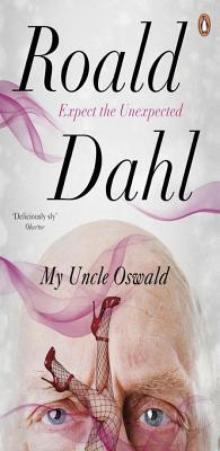 My Uncle Oswald
My Uncle Oswald The Best of Roald Dahl
The Best of Roald Dahl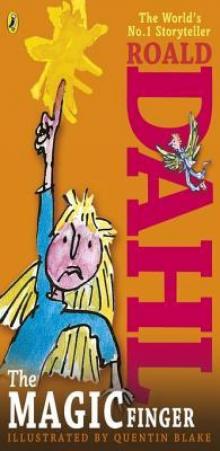 The Magic Finger
The Magic Finger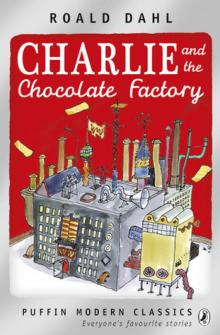 Charlie and the Chocolate Factory
Charlie and the Chocolate Factory Fantastic Mr Fox
Fantastic Mr Fox Matilda
Matilda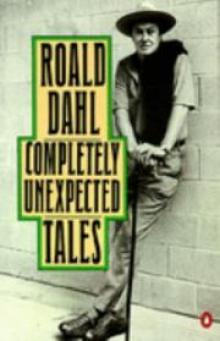 Completely Unexpected Tales: Tales of the Unexpected. More Tales of the Unexpected
Completely Unexpected Tales: Tales of the Unexpected. More Tales of the Unexpected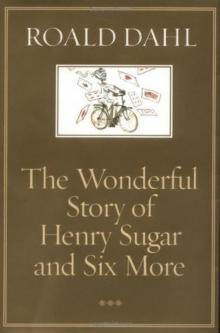 The Wonderful Story of Henry Sugar and Six More
The Wonderful Story of Henry Sugar and Six More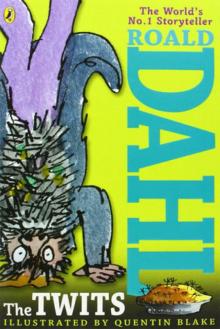 The Twits
The Twits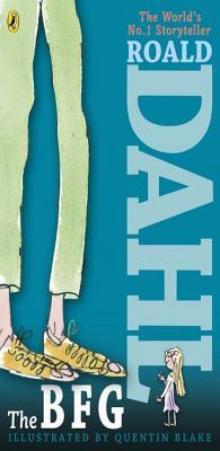 The BFG
The BFG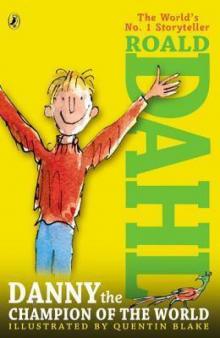 Danny the Champion of the World
Danny the Champion of the World The Witches
The Witches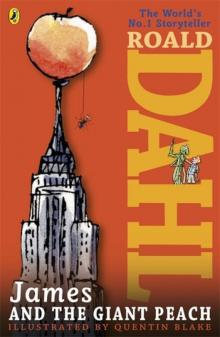 James and the Giant Peach
James and the Giant Peach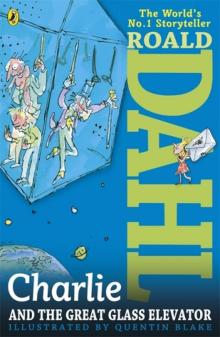 Charlie and the Great Glass Elevator
Charlie and the Great Glass Elevator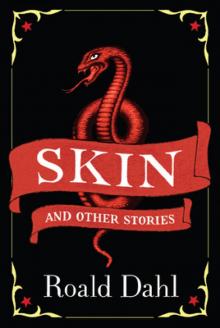 Skin and Other Stories
Skin and Other Stories Kiss Kiss
Kiss Kiss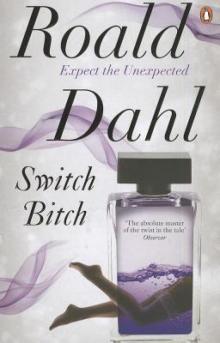 Switch Bitch
Switch Bitch The Giraffe and the Pelly and Me
The Giraffe and the Pelly and Me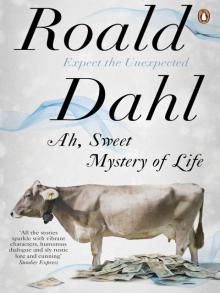 Ah, Sweet Mystery of Life
Ah, Sweet Mystery of Life Fear
Fear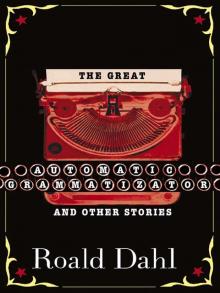 The Great Automatic Grammatizator and Other Stories
The Great Automatic Grammatizator and Other Stories Someone Like You
Someone Like You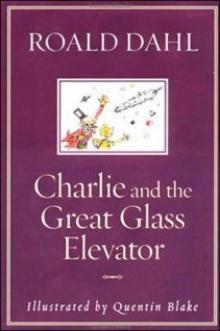 Charlie and the Great Glass Elevator c-2
Charlie and the Great Glass Elevator c-2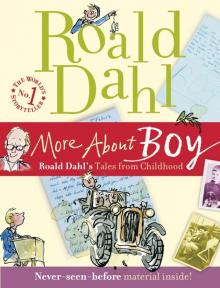 More About Boy
More About Boy Tales of the Unexpected
Tales of the Unexpected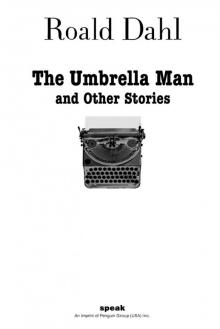 The Umbrella Man and Other Stories
The Umbrella Man and Other Stories Dirty Beasts
Dirty Beasts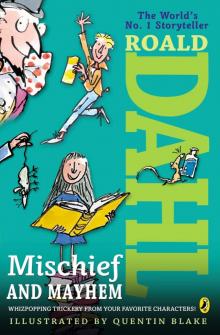 Roald Dahl's Mischief and Mayhem
Roald Dahl's Mischief and Mayhem The Collected Short Stories of Roald Dahl, Volume 1
The Collected Short Stories of Roald Dahl, Volume 1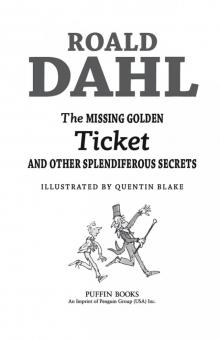 The Missing Golden Ticket and Other Splendiferous Secrets
The Missing Golden Ticket and Other Splendiferous Secrets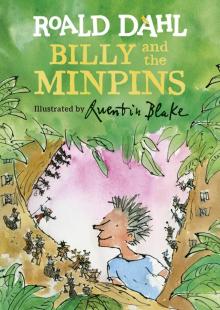 Billy and the Minpins
Billy and the Minpins Over to You
Over to You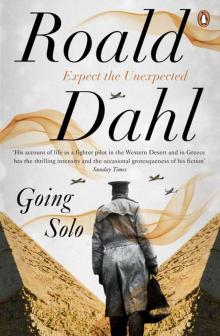 Going Solo
Going Solo Deception
Deception War
War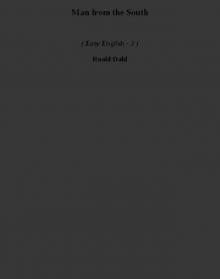 Man from the South ee-3
Man from the South ee-3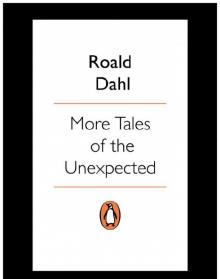 More Tales of the Unexpected
More Tales of the Unexpected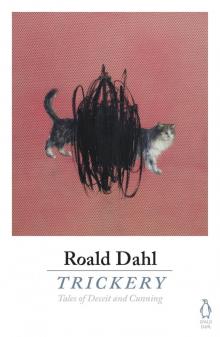 Trickery
Trickery Rhyme Stew
Rhyme Stew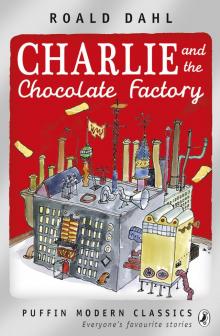 Charlie and the Chocolate Factory (Puffin Modern Classics relaunch)
Charlie and the Chocolate Factory (Puffin Modern Classics relaunch)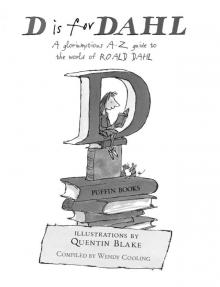 D is for Dahl
D is for Dahl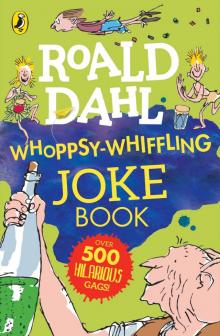 Roald Dahl Whoppsy-Whiffling Joke Book
Roald Dahl Whoppsy-Whiffling Joke Book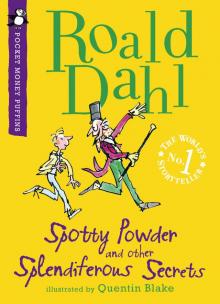 Spotty Powder and other Splendiferous Secrets
Spotty Powder and other Splendiferous Secrets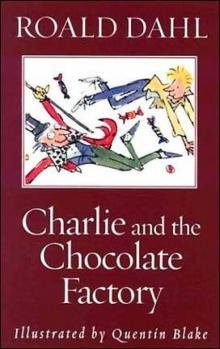 Charlie and the Chocolate Factory c-1
Charlie and the Chocolate Factory c-1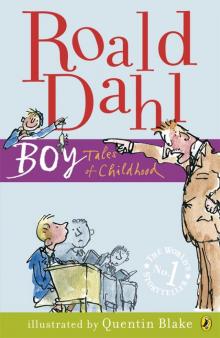 Boy
Boy Completely Unexpected Tales
Completely Unexpected Tales Madness
Madness Innocence
Innocence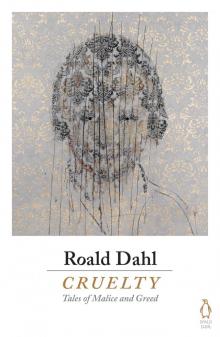 Cruelty
Cruelty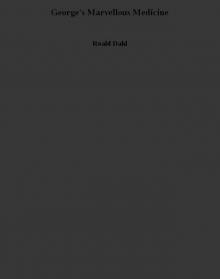 George's Marvellous Medicine
George's Marvellous Medicine